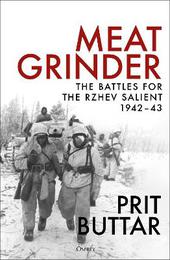
|
Meat Grinder: The Battles for the Rzhev Salient, 1942-43
Hardback
Main Details
| Title |
Meat Grinder: The Battles for the Rzhev Salient, 1942-43
|
| Authors and Contributors |
By (author) Prit Buttar
|
| Physical Properties |
| Format:Hardback | | Pages:464 | | Dimensions(mm): Height 234,Width 153 |
|
| Category/Genre | Second world war |
|---|
| ISBN/Barcode |
9781472851819
|
| Classifications | Dewey:940.54217 |
|---|
| Audience | |
|---|
| Illustrations |
16 pages of plates in black and white
|
|
Publishing Details |
| Publisher |
Bloomsbury Publishing PLC
|
| Imprint |
Osprey Publishing
|
| Publication Date |
13 October 2022 |
| Publication Country |
United Kingdom
|
Description
The Soviet counteroffensive in late 1941 drove the Wehrmacht back from the outskirts of Moscow, inflicting the first serious setback suffered by the Germans in the war. But the counteroffensive, intended to destroy the Wehrmacht divisions and thus pave the way for a swift Soviet victory, gradually petered out as casualties, German resistance, and organisational and logistic difficulties brought the Red Army to a halt. The result was a convoluted front line, with a large salient projecting north from Vyasma to Rzhev. For the Germans, this represented a jumping-off point for a future renewed drive on Moscow, and the Red Army was therefore anxious to destroy the salient. As is often the case in protracted struggles, the importance of victory in the battles that followed assumed a disproportionate importance. The Red Army launched four major offensives against the salient, all of which were defeated with heavy losses, exceeding two million killed, wounded or missing. Eventually, the Germans evacuated the salient in March 1943, but the fighting had left them with over half a million casualties. The battles saw Walter Model establish his reputation for determined defensive warfare, an attribute that Hitler grew to value as vital if defeat was to be avoided; largely due to his successes in and around the salient, Model was dispatched by Hitler to one sector after another through 1944 in attempts to prevent the Eastern Front from collapsing. After the war, orthodox Soviet historiography pointedly avoided acknowledging the failure of Red Army offensives against the Rzhev Salient. One operation in particular, codenamed Mars, coincided with the encirclement of the German Sixth Army in Stalingrad and actually involved far more Soviet troops than the fighting in the south; the few mentions of the operation in Soviet accounts attempted to portray it as a successful attempt to tie down German forces in the central sector while the blow against Stalingrad was struck, and it is only very recently that the magnitude of the Soviet defeat has become better known. For the Germans who fought through this battle, the salient became known as the 'Meat Grinder'. However, the Red Army learned from its failures to breach the German defensive lines, and analysis of these failures, combined with detailed study of the German defences after the final German evacuation of the salient, helped pave the way for the Soviet victory against Army Group Centre in Operation Bagration in the summer of 1944 leaving the road to Berlin clear.
Author Biography
Prit Buttar studied medicine at Oxford and London before joining the British Army as a doctor. After leaving the army, he worked as a GP, first near Bristol and then in Abingdon, Oxfordshire. He now lives in Kirkcudbright in Scotland. He is extensively involved in medical politics, both at local and national level, and served on the GPs' Committee of the British Medical Association. He has appeared on national TV and radio, speaking on a variety of medical issues. He contributes regularly to the medical press. An established expert on the Eastern Front in 20th century military history, his previous books include the critically acclaimed Battleground Prussia: The Assault on Germany's Eastern Front 1944-45 (Osprey 2010) and Between Giants: The Battle for the Baltics in World War II (Osprey 2013). The Splintered Empires:The Eastern Front 1917-21 is the last volume in his definitive four-part series on the Eastern Front in World War I.
ReviewsThis vivid and gripping account of the Rzhev sector from 1941 to 1943 is of fundamental significance for our understanding of the Eastern Front and therefore for studies of the Second World War. Providing both narrative and analysis, it shows the strengths and weaknesses of both sides and does so in a way that bridges high strategy and the face of battle. The difficulty of overcoming defences emerges repeatedly in a story that thrills and fascinates in equal measure, taking us back into the furnace of battle at its most intense. * Jeremy Black, author of 'Rethinking World War Two' * In Meat Grinder, renowned Eastern Front expert Prit Buttar chronicles in superb detail a largely forgotten episode of the Second World War, in which Soviet and German forces battled for control of the Rzhev Salient in 1942-43. In this compelling account of a terrible attritional struggle, readers will find many stark parallels in the intense fighting in the Donbas some eighty years later, not least the crushing effect of artillery fire on fortifications and fortitude. * General Mungo Melvin, author of 'Sevastopol's Wars' * This is an excellent book and a worthy addition to studies of the Eastern Front. * Aspects of History * Informative ... "Meat Grinder: The Battles for the Rzhev Salient, 1942-43" is a comprehensive detailed history that is a simply fascinating read from first page to last. * Midwest Book Review *
|